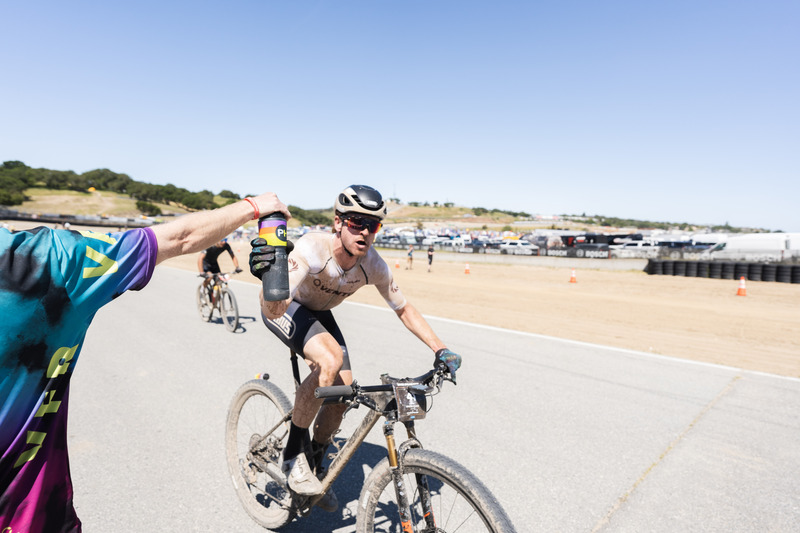The Leadville Trail 100 MTB is one of the most gruelling mountain bike races in the world. The 100-mile course includes 12,000 feet (3,600 metres) of elevation gain and tops out at 12,600ft (3,800 metres)!
We've had quite a few one-to-one video calls with athletes who are preparing their fueling strategy for Leadville, so we thought we'd ask two athletes from the elite field how they're preparing for the altitude.
We caught up with Gravel Worlds Champion, John Borstelmann, and triathlete Lisa Becharas, who made the switch to gravel riding recently...
Hey guys, can you talk us through the specific altitude training that you've done for Leadville
John: I've been trying to sleep close to 8,200 ft (2,500m) for the six weeks leading up to the race. That's a high enough elevation to gain some significant altitude adaptation without affecting my sleep and recovery from hard sessions, while it's low enough to make it feasible to train near 4,900ft (1,500m). I have a camper van, and I've been staying in Colorado and Utah which offer plenty of high elevation camping opportunities.

Lisa: I haven't done a ton of specific altitude training for Leadville outside of doing some weekly sauna prep and one trip up to Leadville two and a half weeks before to ride most of the course.
I believe that there's been some good research with sauna prep helping athletes acclimate to higher elevations, so figured I would give it a try as it helped a lot with a hotter race earlier this season.
How soon before the race will you head to Leadville?
John: I've been staying near Boulder for the past two weeks, sleeping at elevation and spending my days training at 4,900ft (1,500m). I drove the two hours to Leadville on Thursday, two days before the race, for media obligations, even though I would have preferred to wait until the day before the race.
I'm sleeping in Frisco, CO at an elevation of 9,200ft (2,800m) the two nights before the race.
Lisa: I'm travelling up two days before the race from Boulder. I wanted to come up as close to the race as I could to hopefully fend off any extra fatigue from spending lots of time up there!
How does racing at altitude affect your race strategy?
John: Altitude makes it much harder to recover from hard, punchy efforts. So, I will do my best to limit my time spent pedalling above my lactate threshold power, ideally staying below it on all climbs until the very end of the race. The effects of altitude make hydration even more important than usual, so I'll also take extra care to keep my fluids and electrolytes topped up as much as possible during the race.
Lisa: This will only be my third time ever racing a mountain bike (first two were in May at Xterra Oak Mountain) so not only is this an altitude race, but I also very much consider myself a newbie to this sport! I don't have a power meter on my bike, so my main focus will be on effort, staying within myself and making sure that I'm not burning too many matches early on!
Does altitude racing suit you?
Lisa: I'm not a great altitude racer. In fact, my strengths are quite the opposite to everything about Leadville! I'm a sea level, flatlander who excels at riding time-trial bikes for one-to-two hours!
John: Compared to other athletes at my level, I think I struggle more than most at altitude. The higher the altitude, the more compounded this effect becomes.
I had a fairly awful experience at Leadville last year (average elevation 10,170ft / 3,100m) but turned around the very next day and had a great ride at Steamboat (average elevation 7,200ft / 2,200m) despite a similarly competitive field.
I've gotten faster and felt slightly better each year, so perhaps I'm adapting to altitude on a year over year basis.
And are you making any changes to your fueling and hydration strategy for this one?
John: I think I've honed my fueling and hydration strategy over the past few years. The bigger challenge is sticking to that strategy!
I suffered cramps at Mid South (I think) because I chose to bring less fluid than I should have for weight reasons. And I cramped at Unbound because I neglected to eat and drink for most of the two hours that it took for me to hike through the 11-mile mud section.
So, my hydration and fueling goal is to eat and drink early and often!
Lisa: I'm in unknown territory as the longest I've ever raced was five hours. So, I'm not quite sure how my body will handle the extra hours of racing, but I'm confident in my race nutrition plan of getting in 90 grams of carbohydrate per hour by alternating between the PF 30 Gels, PF 30 Chews and complementing those with PF Carb & Electrolyte Energy Drink Mix, as well as two Electrolyte Capsules per hour.
Let's talk bikes - are you riding a hard tail or a full suspension bike?
Lisa: I'm racing a full suspension, Orbea Oiz (the prettiest bike out there)!
John: Hard tail. I rode a full suspension last year, but my new hard tail is nearly 2kg lighter, and I prefer the stiffness of the rear end for steep, extended climbs.
It's Leadville 100 trail run the week after your race. The record is 15:42. How long do you reckon it'd take you to run it?
Lisa: Oh, I would be out there for a solid three days!
John: I bet I could crack 24 hours if I had enough PF 30 Caffeine Gels!